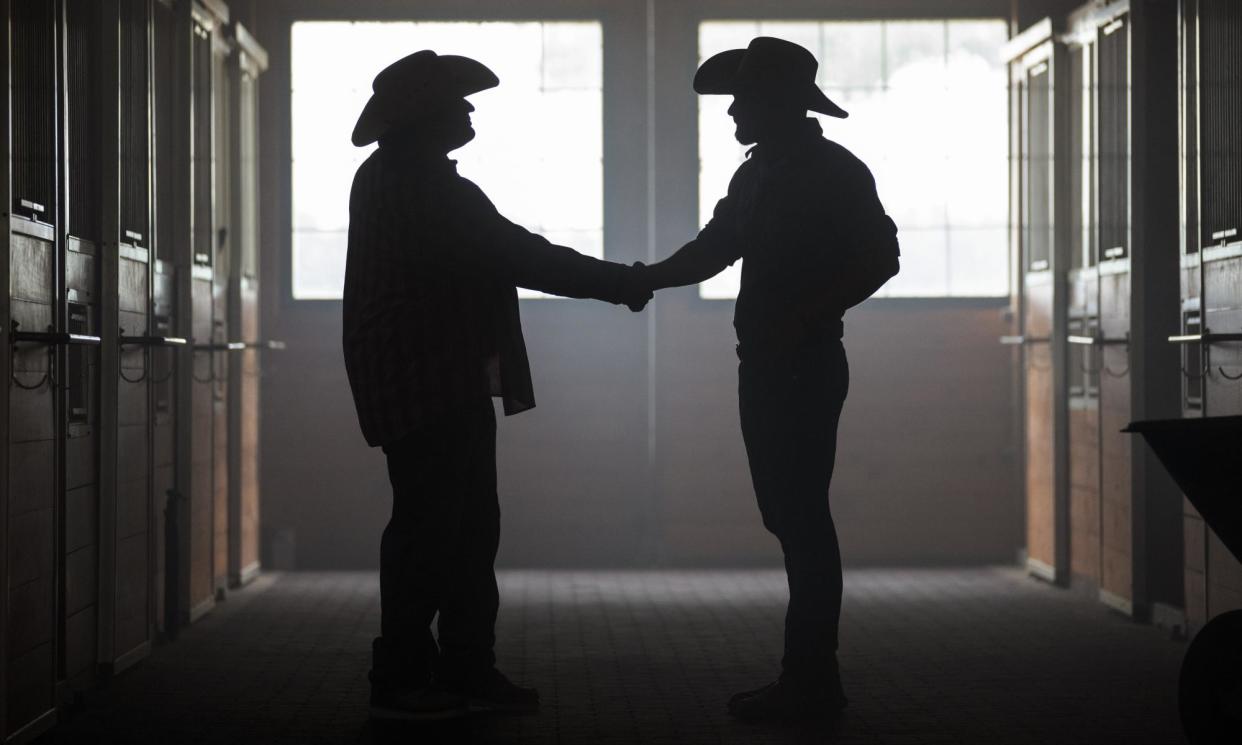Cowboy Cartel review – a tale told so poorly even the talking heads call it ‘anti-climactic’

The one-line summary of Cowboy Cartel, a new Apple TV+ documentary series, is hard to resist. Here is the story of how an inexperienced but determined FBI agent brought down Mexico’s biggest drug cartel – by exposing how they were using American quarter horse racing as the vehicle for a giant money-laundering operation.
Quarter horse racing, which doesn’t really have a UK equivalent, is the wayward southern cousin of thoroughbred racing: the sort of steeds a cowboy would ride, smart and stocky and lightning-fast over short distances, compete in sprints of only a quarter of a mile or so down a straight dirt track. It’s a simple, explosive sporting thrill that has traditionally been awash with doping, illegal gambling and fixing. In 2009, followers of quarter horse racing noticed a new owner, José Treviño Morales, suddenly enjoying great success.
Treviño, a bricklayer based in Dallas, would buy horses at prices that were either curiously high or suspiciously low. Sometimes other people would pop up to pay for the animals on his behalf. Several of his newly acquired beasts unexpectedly won big races, culminating in the 2010 All American Futurity at Ruidoso Downs, New Mexico, a $2m pot scooped by the rank outsider, Mr Piloto. Suspicious? You betcha, especially considering that Treviño’s two brothers, Miguel and Omar, were the infamously ruthless bosses of the Los Zetas cartel. Los Zetas started life as a gang of mercenaries employed as security by Mexican drug traffickers, who eventually became the country’s dominant dealers themselves. Their use of violent intimidation was a level above all their predecessors: areas of Mexico near the US border became no-go zones, a new police chief who promised to stand up to them was assassinated on his first day in the job, and the 2011 killing of Jaime Zapata, a Homeland Security agent driving through Mexico in a car bearing diplomatic plates, was a shattering of an unwritten protocol previous cartels had followed.
All this added up to what FBI special agent Scott Lawson, on his first posting in the border town of Laredo, Texas, realised was a rare opportunity. Traffickers who remain in Mexico are untouchable; drug lords trying to convert their cash into US assets via a bent equine enterprise are not. But it would take a lot of careful, methodical investigative work to take the big prize.
Here is where the problems start. This may have been the biggest money-laundering investigation in the history of Texas, but it was still a case of dutifully following money around to accumulate small pieces of evidence. Sources were worked, phones were tapped, leads were followed up. And that’s about it: a true-crime series wants to end each episode with an “ah, but THEN … ” twist, but Cowboy Cartel doesn’t have any of those up its sleeve. The stakes are high and the targets are fearsome, but the story is kink-free. The producers will have hoped that Lawson, their star interviewee, would turn out to be an effervescent raconteur as well as a diligent investigator – he isn’t.
Cowboy Cartel seems to have been put together by people who haven’t noticed the limitations of their narrative. It’s about two-and-a-half episodes’ worth of story, presented as a four-episode series: at the halfway point all we’ve learned is the basic fact that Mexican wrong’uns were laundering money through their brother’s horse business. A lot of it is FBI agents explaining, in quite similar terms to the other interviewee we just heard from, why something or someone was so important, without this providing jeopardy or drama. In racing terms, it’s less a quarter horse dashing down 400 yards of dirt at Ruidoso Downs to win $2m, and more a dour stayer clumping around Plumpton on a wet Tuesday afternoon for a third-place finish that just about covers that month’s stable fees. Even in the final episode, when various cartel premises are raided and arrests are made, the process is so uneventful, one of the agents who was there actually describes it as “anti-climactic”.
Worst of all, quarter horse racing – with its promise of shady deals, ratty glamour and salty characters – barely features. Apart from a fascinating but frustratingly brief explanation of how the no-hoper Mr Piloto might have won, and an amusing moment where nervous FBI guys with no horse expertise realise that the tattooed serial number identifying a horse’s owner is inside the animal’s mouth, horses hardly come into it. The laundering operation might as well have involved grape nuts or ball bearings. And busting the laundry only brings the bosses down indirectly, in the sense that some of the evidence helps the Mexican authorities make arrests on separate, more serious charges later on.
Cowboy Cartel is perfectly well-made and will just about keep your interest to the end, but a wild ride it ain’t.
• Cowboy Cartel is on Apple TV+


